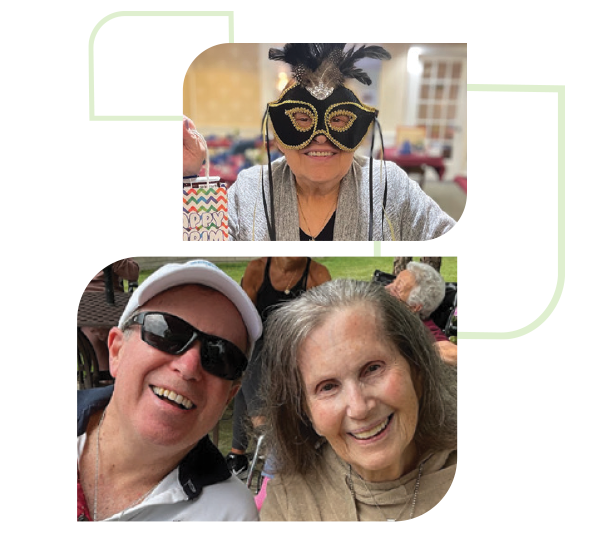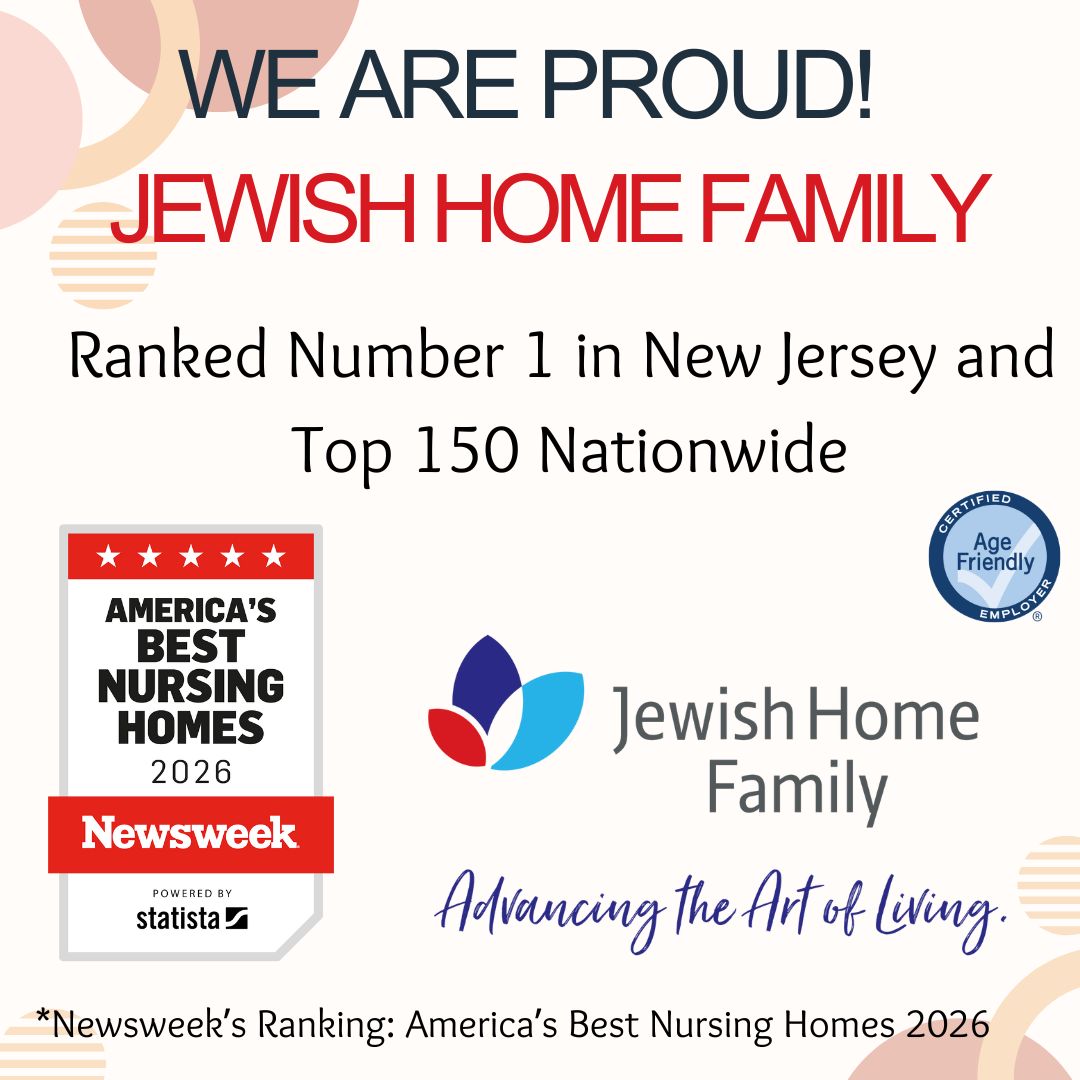Assisted Living Near Ridgefield Park: Why Jewish Home Family Is Worth The Drive, If You Live In New Jersey: Discover the value of choosing Jewish Home Family as your destination for quality senior care in Northern New Jersey
Discover how our innovative approach to senior care at Jewish Home Family in New Jersey can cater to all your unique needs, providing exceptional support and services tailored to your preferences and requirements.
The Jewish Home Family Difference
When it comes to senior care, Jewish Home Family stands out for its:
- Person-centered care model
- Comprehensive medical services
- Engaging and stimulating activities
Our team of dedicated professionals is committed to creating a warm and welcoming environment where residents can thrive and enjoy a fulfilling lifestyle. With a focus on individualized care plans and ongoing support, we ensure that each resident receives the attention and assistance they need to live life to the fullest.
Jewish Home Family 10 Link Dr, Rockleigh, NJ 07647, United States, +12017841414
For more information – Click Here
Comprehensive Medical Services and Care Programs
Providing top-notch healthcare for residents is paramount in any assisted living community. High-quality medical services and care programs are essential components that contribute to the overall well-being and satisfaction of individuals residing in a senior living facility.
- Emphasizing the importance of personalized care plans tailored to each resident’s unique needs can significantly enhance their quality of life.
- Ensuring access to a team of experienced healthcare professionals, including doctors, nurses, and specialists, is crucial for addressing any medical concerns promptly and effectively.
- Implementing innovative technologies in healthcare delivery can streamline processes, improve accuracy, and enhance the overall patient experience.
Moreover, fostering a collaborative approach between medical staff, residents, and their families can create a supportive environment that promotes open communication and trust.
- Expert Tip: Encouraging regular health screenings and check-ups can help in early detection of any potential health issues, leading to timely interventions.
- Quantitative Measurement: Tracking health outcomes and satisfaction levels among residents can provide valuable insights for continuous improvement in medical services.
While providing quality medical services and care programs requires dedication and expertise, the positive impact it has on residents’ lives makes it a worthwhile investment for any senior living community.
Engaging Lifestyle Activities for Seniors
For seniors looking to stay active and social, there are numerous engaging lifestyle activities that can provide both mental stimulation and physical exercise.
- Variety of Activities: Offering a diverse range of activities can keep seniors interested and motivated, including arts and crafts, music therapy, gardening, and cooking classes.
- Mind Games: Engaging in brain-teasing games like crossword puzzles, Sudoku, and memory games can help improve cognitive function and memory retention.
- Physical Exercise: Incorporating gentle exercises such as yoga, tai chi, and water aerobics can help seniors stay fit and flexible without putting too much strain on their bodies.
Creating a community where seniors can participate in these activities together fosters a sense of camaraderie and support among residents.
Benefits of Engaging Lifestyle Activities:
- Social Interaction: Encouraging seniors to engage in group activities can combat feelings of loneliness and isolation, promoting mental well-being.
- Improved Quality of Life: Participating in stimulating activities can enhance emotional health and overall satisfaction with life.
- Physical Health: Regular physical activity can help prevent chronic conditions, improve mobility, and boost energy levels.
By offering a variety of engaging lifestyle activities, senior living communities can cater to the diverse interests and needs of their residents, promoting a fulfilling and enriching experience for all.

Family-Centered Care Philosophy
Family-Centered Care Philosophy, also known as patient-centered care, revolves around the idea that the family plays a vital role in the well-being and recovery of the individual. This approach emphasizes collaboration between healthcare providers and family members to ensure the best possible outcomes. The philosophy focuses on creating a supportive environment that considers the needs, preferences, and values of both the patient and their family.
- Encourages open communication and shared decision-making
- Promotes a holistic approach to care that addresses not only the physical but also the emotional and social aspects of health
- Recognizes the family as an essential source of emotional support and caregiving
By involving family members in the care process, healthcare providers can gain valuable insights into the patient’s background, preferences, and social dynamics. This collaboration can lead to more personalized and effective care plans that take into account the individual’s unique circumstances.
- Enhances patient satisfaction and overall experience
- Improves health outcomes and reduces the risk of medical errors
- Strengthens the bond between the patient, family, and healthcare team
Convenient Location and Transportation Services
1. Location plays a pivotal role in the decision-making process when choosing a senior living community.
2. The proximity to essential services such as medical facilities, shopping centers, and recreational areas is crucial for residents’ convenience.
3. Living in a well-connected neighborhood with reliable transportation options enhances the overall quality of life for seniors.
4. Access to public transportation, shuttle services, and designated driver services can make daily activities more accessible for residents.
5. Transportation services provided by the community can include scheduled outings to local attractions, grocery stores, and medical appointments, offering residents independence and peace of mind.
6. Being located in a bustling area with easy access to public transport can also foster a sense of community and social engagement among residents.
7. It is important to consider the transportation services available to ensure that residents can maintain an active and fulfilling lifestyle.
8. Efficient transportation services contribute to the overall well-being of residents by promoting social interactions and participation in various activities.
9. The availability of transportation options can significantly impact the residents’ ability to remain connected with the broader community and maintain a sense of independence.
10. When evaluating senior living communities, assessing the convenience of the location and transportation services can greatly enhance the overall living experience for residents.
Testimonials from Satisfied Residents and Families
Exploring the heartfelt accounts from delighted residents and their families sheds light on the true essence of the community. The words of contentment, gratitude, and admiration paint a vivid picture of the enriching experiences within the facility.
- Each testimonial acts as a testament to the exceptional care and support provided.
- The personal narratives showcase the strong bonds formed between residents and staff, creating a warm and welcoming environment.
- Expressions of joy and appreciation highlight the positive impact on the overall well-being of individuals residing in the community.
Delving deeper into these testimonials reveals the intricate details of daily life within the facility. From heartwarming anecdotes to inspiring journeys of personal growth, the testimonials capture the essence of the community’s dedication to fostering a supportive and nurturing atmosphere.
| Pros | Cons |
|---|---|
| Compassionate staff members | Limited recreational facilities |
| Engaging social activities | Restricted visiting hours |
- Expert Tip: Encourage open communication between residents, families, and staff to enhance the sense of community.
- Quantitative Measurement: High satisfaction rates among residents indicate the quality of care and services provided.

